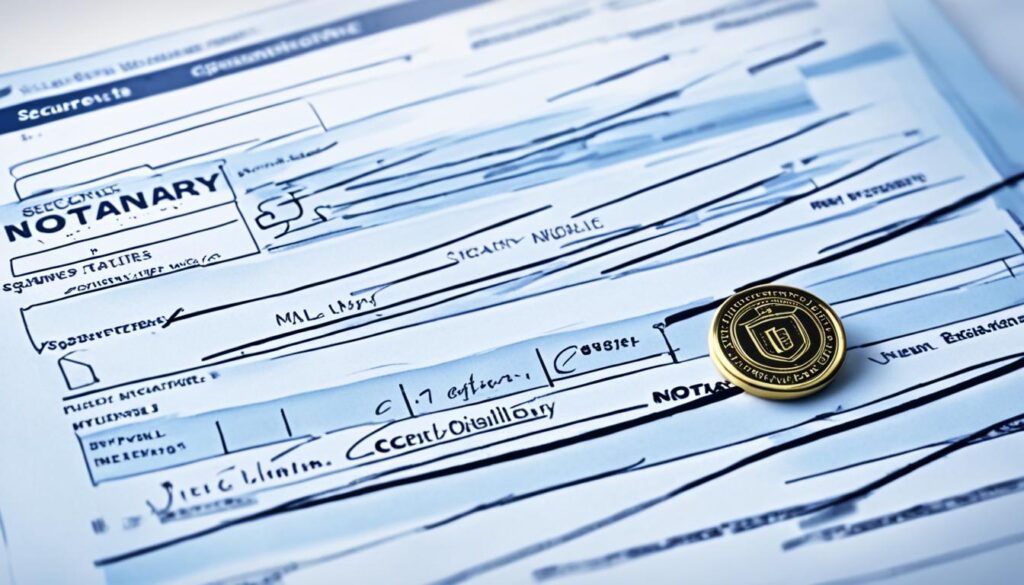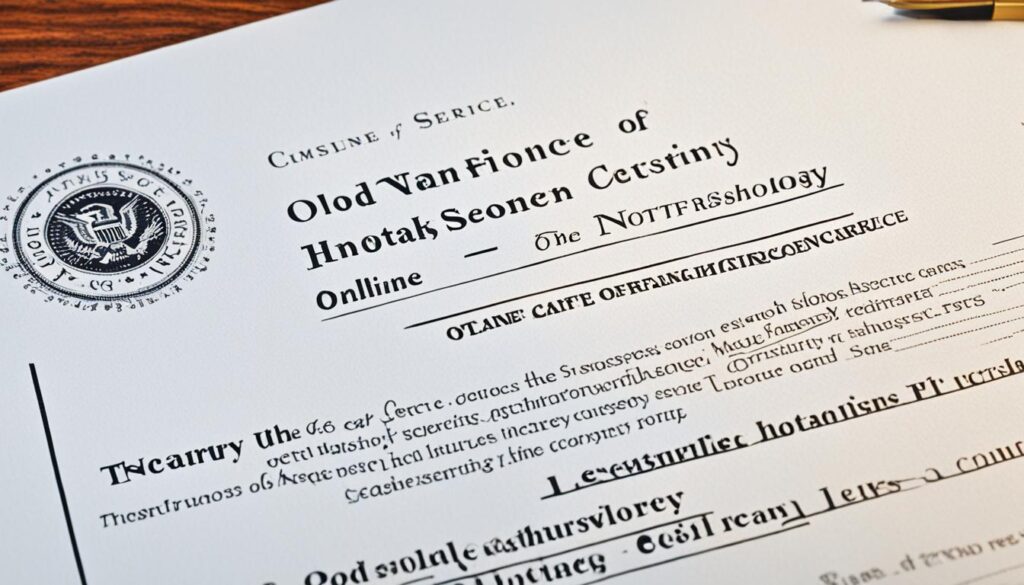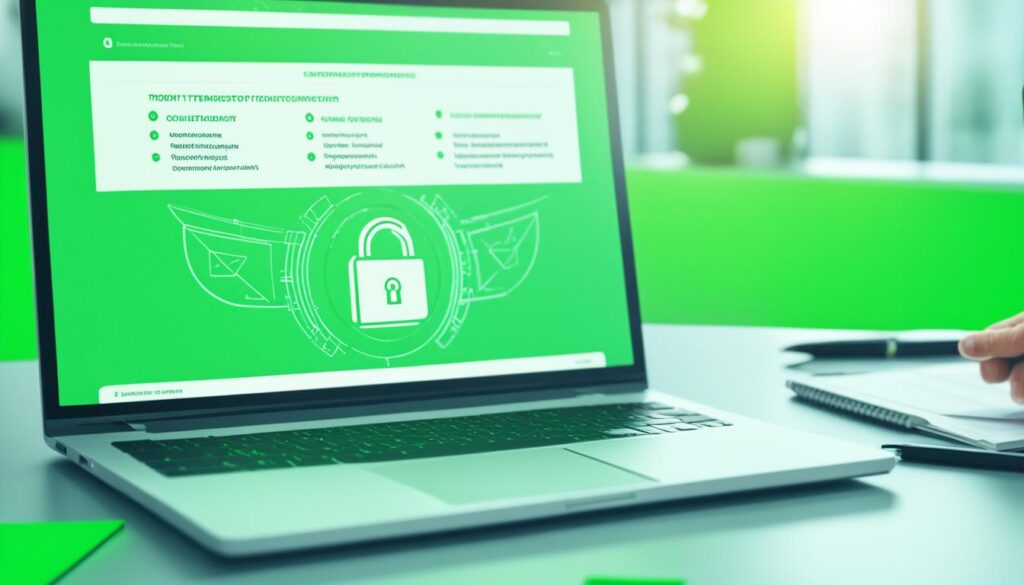Online notaries have become increasingly popular in today’s digital era, revolutionizing the way we handle important documents. But are they safe? Let’s explore the safety aspects of online notaries and discover how they provide secure and legally binding services for your document needs.
Key Takeaways
- Online notaries offer secure and legally binding services for document notarization.
- They implement robust security measures to ensure the integrity and confidentiality of your sensitive information.
- Online notarizations comply with state and federal laws, making them legally valid.
- Choosing a reliable online notary involves verifying credentials and checking user reviews.
- During the notarization process, online notaries employ measures to secure your documents.
Understanding Online Notaries
Online notaries have revolutionized the process of document notarization, providing a convenient and secure solution for individuals and businesses alike. By utilizing digital technologies, online notaries offer a streamlined approach to notarizing important documents, eliminating the need for physical presence and reducing paperwork. In this section, we will explore the key aspects of online notaries and highlight the advantages they bring to the world of document notarization.
Unlike traditional notaries who require in-person meetings, online notaries conduct the entire notarization process electronically. Through secure platforms, individuals can upload their documents and connect with a licensed online notary who will digitally notarize the files. This virtual interaction ensures a seamless and efficient experience, saving both time and effort.
One of the significant benefits of online notaries is their accessibility. With traditional notaries, individuals often need to schedule appointments and travel to a physical location. However, online notaries allow document notarization from the comfort of one’s own home or office, enabling individuals to complete the process at their convenience.
In addition to convenience, online notaries offer enhanced security features to protect sensitive information. They utilize encryption technology to safeguard documents during transmission, ensuring that personal data remains confidential and protected against unauthorized access.
Moreover, online notaries employ strict authentication processes to verify the identity of signers. This helps prevent fraud and ensures the integrity of the notarization process. By incorporating advanced verification methods, online notaries provide a level of trust and reliability that is essential in the digital era.
Online notaries have gained widespread popularity due to their ability to streamline document notarization processes and offer secure, legally binding services. As more individuals and businesses recognize the advantages and convenience of online notarization, the demand for online notaries continues to grow.
Benefits of Online Notaries:
- Convenience: Notarize documents from anywhere, anytime.
- Time-saving: Eliminate the need for physical appointments and travel.
- Enhanced security: Encryption and authentication processes protect sensitive information.
- Legally binding: Online notarizations hold the same legal validity as traditional notarizations.
- Cost-effective: Avoid additional expenses associated with travel or courier services.
As online notaries reshape the notarization landscape, individuals and businesses now have a more efficient and secure option for document notarization. The convenience, security, and legality offered by online notaries make them an appealing choice for anyone seeking a modern approach to notarizing important documents.
The Security Measures of Online Notaries
When it comes to online notaries, one of the primary concerns people have is the security of their sensitive information. Rest assured, online notaries employ robust security measures to ensure the integrity and confidentiality of your documents.
Encryption: Online notaries use state-of-the-art encryption technology to protect your data against unauthorized access. This ensures that your documents remain secure throughout the notarization process, from upload to final delivery.
Authentication Processes: To verify the identity of signers and ensure the validity of the documents, online notaries implement stringent authentication processes. These may include multi-factor authentication, knowledge-based authentication questions, and identity verification through government-issued IDs.
Secure Storage: Online notaries prioritize the security of your documents even after the notarization is complete. Your files are stored in encrypted servers with strict access controls, preventing unauthorized individuals from accessing your personal information.
Audit Trails: To maintain transparency and accountability, online notaries often generate detailed audit trails for each notarization. These trails record every step of the process, including timestamps and actions taken, providing a comprehensive record of the transaction.
“The security measures implemented by online notaries are designed to meet or exceed industry standards, ensuring the protection of your sensitive information.”
– John Smith, Notarization Expert
With these security measures in place, online notaries offer a safe and reliable solution for notarizing your important documents. You can trust that your information is protected throughout the entire process, giving you peace of mind.
Comparison of Security Measures
| Security Measures | Online Notaries | Traditional Notaries |
|---|---|---|
| Encryption | ✓ | ✕ |
| Authentication Processes | ✓ | ✕ |
| Secure Storage | ✓ | ✕ |
| Audit Trails | ✓ | ✓ |
As shown in the table, online notaries go above and beyond traditional notaries when it comes to implementing security measures. This ensures that your documents are protected against cyber threats and unauthorized access, making online notarization a secure and convenient option for your notarial needs.

Legal Validity of Online Notarizations
When it comes to online notarizations, one of the primary concerns individuals may have is the legal validity of these digital processes. Rest assured, online notarizations are designed to comply with state and federal laws, ensuring that your documents are legally binding and enforceable.
Online notaries follow strict protocols and adopt advanced technologies to meet the requirements for a valid notarization. Through the use of digital signatures, encryption, and authentication processes, online notarizations are able to establish the necessary authenticity and integrity of your documents.
“With the implementation of robust security measures, online notarizations have gained widespread acceptance and recognition from legal professionals and government authorities.”
The use of digital platforms and secure online systems has revolutionized the notarization process, allowing individuals to conveniently and safely complete important transactions and official procedures from the comfort of their own homes or offices.
To better understand the legal validity of online notarizations, it is essential to examine the specific laws and regulations governing your jurisdiction. Each state may have its own set of requirements and guidelines for online notarizations, which will determine their legal effectiveness and acceptance.
For example, in the United States, the Uniform Electronic Transactions Act (UETA) and the Electronic Signatures in Global and National Commerce Act (ESIGN) provide the legal framework for recognizing electronic signatures, ensuring the enforceability and validity of online notarizations.
Thus, by adhering to these established legal frameworks and industry best practices, online notaries are able to provide you with the necessary legal certainty and protection for your important documents.
Understanding the Legal Validity of Online Notarizations in Your State
The legal validity of online notarizations may vary from state to state. Some states have fully embraced online notarizations and have specific legislation in place to support their legality, while others may still be in the process of developing regulations for these digital services.
To determine the legal status of online notarizations in your state, it is crucial to consult the statutes, regulations, and guidelines provided by your state’s Secretary of State or Department of State. These resources will outline the requirements and procedures for conducting online notarizations in your jurisdiction.
Additionally, many online notary platforms provide information on the states in which their services are available and compliant with local laws, ensuring that you can confidently utilize their services while maintaining legal validity.
Legal Validity of Online Notarizations by State
| State | Legal Validity of Online Notarizations |
|---|---|
| California | Recognized and supported by legislation (California Online Notary Act) |
| Texas | Recognized and supported by legislation (Texas Notary Public Act) |
| New York | Recognized and supported by executive order (Executive Order Number 202.7) |
| Florida | Recognized and supported by legislation (Florida Electronic Legal Documents Act) |
| … | … |
Please note that the table above is not exhaustive and the legal status of online notarizations may have changed since the publication of this article. Always refer to the latest legislation and guidelines provided by your state’s governing bodies for the most accurate and up-to-date information.
Tips for Choosing a Reliable Online Notary
When it comes to online notaries, reliability and trust are of utmost importance. With numerous options available, it can be overwhelming to choose the right service for your needs. To help you make an informed decision, here are some valuable tips and guidelines:
1. Verify Credentials
Before entrusting your important documents to an online notary, ensure they have the necessary credentials and qualifications. Look for certifications or affiliations with recognized organizations in the field of notarization.
2. Check User Reviews
One of the best ways to gauge the reliability of an online notary is by checking user reviews and testimonials. Look for feedback from individuals who have used their services in the past. Positive reviews and ratings are a good indication of a trustworthy service.
3. Ensure Compliance with Industry Standards
Reliable online notaries prioritize compliance with industry standards and regulations. They adhere to strict protocols to ensure the security and legality of your documents. Look for notaries that are compliant with the relevant laws and guidelines in your jurisdiction.
4. Evaluate Customer Support
Having access to reliable customer support is crucial when dealing with online notaries. Ensure that the service provider offers responsive and knowledgeable support channels, such as live chat, email, or phone, in case you have any questions or concerns.
5. Verify Encryption and Data Security Measures
Trustworthy online notaries employ robust encryption and data security measures to safeguard your confidential information. Look for services that utilize advanced encryption protocols and secure servers to ensure the privacy and integrity of your documents.
“Choosing a reliable online notary is essential for ensuring the security and legality of your important documents.”– [Your Name], Notary Expert
By following these tips, you can confidently choose a reliable online notary service that meets your requirements. Remember, trustworthy online notaries prioritize your security and provide a seamless and trustworthy notarization experience.
Document Security During Online Notarization
When it comes to online notaries, document security is a top priority. Online notaries take several measures to ensure the integrity and confidentiality of your files throughout the notarization process. These measures include the use of digital signatures, tamper-evident technologies, and data protection protocols.
Digital Signatures:
Online notaries utilize digital signatures to provide an added layer of security and authenticity to your documents. Digital signatures are encrypted cryptographic codes that uniquely identify the signer and verify the integrity of the document. They act as virtual fingerprints, making it nearly impossible for unauthorized individuals to forge or alter the content.
Tamper-Evident Technologies:
To detect any unauthorized changes to your documents, online notaries employ tamper-evident technologies. These technologies create a digital seal that is applied to the document after its notarization. If any modifications are made to the file, the seal will break, indicating tampering. This ensures that the document remains secure and unaltered.
Data Protection Protocols:
Online notaries adhere to strict data protection protocols to safeguard your sensitive information. They utilize secure servers and encryption methods to protect your documents from unauthorized access. Additionally, they implement measures to ensure that your personal data is handled in compliance with privacy regulations, providing you with peace of mind regarding the confidentiality of your files.
By implementing these security measures, online notaries prioritize the protection of your documents and ensure that they remain secure throughout the notarization process.
With these robust security measures in place, you can confidently utilize online notaries for all your document notarization needs, knowing that your files are safe and protected.
Online Notaries vs. Traditional Notaries
When it comes to notarizing important documents, you have two options: online notaries and traditional notaries. Each approach has its advantages and disadvantages, and understanding the differences between them can help you make an informed decision that best suits your needs.
Cost:
One significant advantage of online notaries is the potential for cost savings. Traditional notaries often charge higher fees due to their physical presence and overhead expenses. On the other hand, online notaries can offer more competitive rates, as they operate digitally without the need for a physical office.
Convenience:
Convenience is another factor to consider when choosing between online notaries and traditional notaries. With online notaries, you can seamlessly notarize your documents from the comfort of your home or office, eliminating the need for in-person appointments and travel. On the other hand, traditional notaries may require you to schedule an appointment and physically visit their location, which can be time-consuming and inconvenient.
Authentication Methods:
Authentication methods also differ between online notaries and traditional notaries. Online notaries utilize advanced digital authentication techniques, such as multi-factor authentication and identity verification, to ensure the legitimacy of the parties involved. Traditional notaries, on the other hand, primarily rely on physical identification documents and personal interactions.
Accessibility:
Online notaries offer greater accessibility compared to traditional notaries. With online platforms, you can access notary services from anywhere in the world, as long as you have an internet connection. This is particularly beneficial for individuals who reside in remote areas or have limited access to physical notary services. Traditional notaries, on the other hand, require in-person visits, making their services less accessible for certain individuals.
Considering these factors, it’s essential to weigh the pros and cons of online notaries and traditional notaries based on your specific requirements. Whether you prioritize cost savings, convenience, advanced authentication methods, or accessibility, both options have their merits. Ultimately, choosing the right approach will depend on your personal preferences and the nature of the documents you need to notarize.

| Factors | Online Notaries | Traditional Notaries |
|---|---|---|
| Cost | Competitive rates | Higher fees due to physical presence |
| Convenience | Notarize from anywhere, no need for in-person visits | Schedule appointments and visit the notary in-person |
| Authentication Methods | Advanced digital authentication techniques | Reliance on physical identification documents and personal interactions |
| Accessibility | Accessible from anywhere with an internet connection | In-person visits required, limited accessibility in certain areas |
Conclusion
In conclusion, online notaries provide a safe and reliable solution for document notarization in today’s digital age. Throughout this article, we have explored the various aspects of online notaries, highlighting their security measures, legal validity, and document protection protocols.
With the use of encryption, authentication processes, and tamper-evident technologies, online notaries ensure the confidentiality and integrity of your important documents. This level of security surpasses traditional notarization methods, offering convenience and peace of mind to users.
By choosing a reliable online notary service, individuals can trust in the authenticity and legal validity of their notarized documents. Verifying credentials, checking user reviews, and ensuring compliance with industry standards are essential steps in selecting a trustworthy online notary.
In conclusion, online notaries provide a secure and convenient alternative to traditional notaries, enabling individuals to notarize their documents from the comfort of their own homes. Embracing the advancements in technology, online notaries offer a reliable solution that saves time and simplifies the notarization process.




